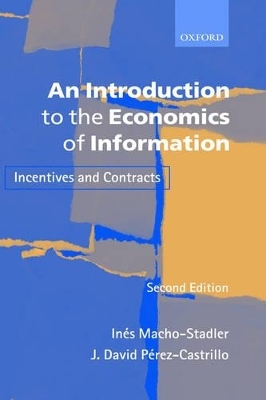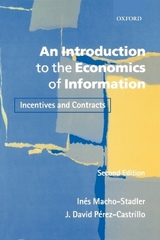
An Introduction to the Economics of Information
Oxford University Press (Verlag)
978-0-19-924327-3 (ISBN)
- Titel erscheint in neuer
- Artikel merken
In this revised second edition, An Introduction to the Economics of Information covers the consequences for the character and efficiency of the interaction between individuals and organizations when one party has more or better information on some aspect of the relationship. This is the condition of asymmetric information, under which the information gap will be exploited if, by doing so, the better-informed party can achieve some advantage. The book is written for a one-semester course for advanced undergraduates taking specialized course options, and for first-year postgraduate students of economics or business.
After an introduction to the subject and the presentation of a benchmark model in which both parties share the same information throughout the relationship, chapters are devoted to the three main asymmetric information topics of Moral Hazard, Adverse Selection, and Signalling.
The wide range of economic situations where the conclusions are applied includes such areas as finance, regulation, insurance, labour economics, health economics, and even politics. Each chapter presents the basic theory before moving on to applications and advanced topics. The problems are presented in the same framework throughout to allow easy comparison of the different results. This new edition incorporates extended exercises to test the student's understanding of the material, and to develop the tools and skills provided by the main text to solve other, original problems.
Inés Macho-Stadler is Associate Professor of Economics at the Universitat Autonoma de Barcelona. He gained his Ph.D. in Economics from the Ecole Hautes Etudes en Sciences Sociales (Paris). ; J. David Pérez-Castrillo is Associate Professor of Economics at the Universitat Autonoma de Barcelona. He gained his Ph.D. in Economics from the Ecole Hautes Etudes en Sciences Sociales (Paris).
1. Introduction ; 2. The Base Model ; 3. The Moral Hazard Problem ; 4. The Adverse Selection Problem ; 5. Signalling ; Mathematical Appendix ; Additional Exercises
| Erscheint lt. Verlag | 8.3.2001 |
|---|---|
| Übersetzer | Richard Watt |
| Zusatzinfo | numerous line drawings |
| Verlagsort | Oxford |
| Sprache | englisch |
| Maße | 163 x 242 mm |
| Gewicht | 572 g |
| Themenwelt | Wirtschaft ► Allgemeines / Lexika |
| Wirtschaft ► Volkswirtschaftslehre | |
| ISBN-10 | 0-19-924327-1 / 0199243271 |
| ISBN-13 | 978-0-19-924327-3 / 9780199243273 |
| Zustand | Neuware |
| Informationen gemäß Produktsicherheitsverordnung (GPSR) | |
| Haben Sie eine Frage zum Produkt? |
aus dem Bereich



